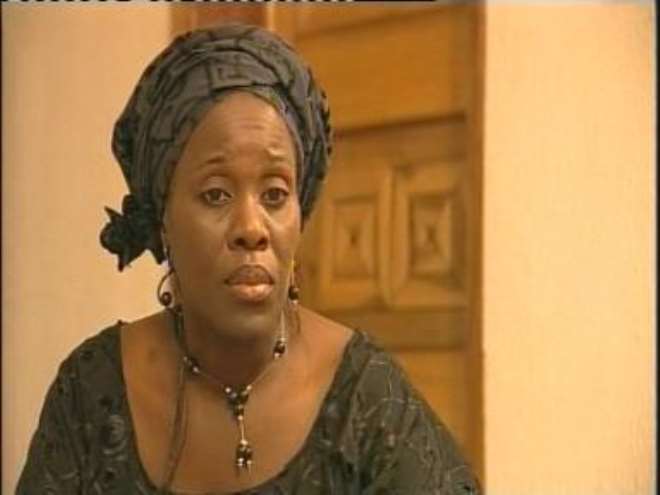HUNGER! NOLLYWOOD PRACTITIONERS CRY OUT
EFFORT of the federal government aimed at branding and repositioning Nigeria, especially the Heart of Africa project may come to naught if practitioners of the movie industry otherwise called Nollywood are involved in drug use and trafficking.
This was the idea behind the recently held Ministerial Interactive Forum with Motion Picture Practitioners on Drug Trafficking with the theme: Drug Trafficking And The Nigerian Image: The Place Of Motion Picture Professionals addressed by the Information and National Orientation Minister, Mr. Frank Nweke Jnr.
However, filmmakers present at the forum unanimously agreed that drug intake as well as trafficking is not the problem of the industry. They fingered lack of infrastructure as well as the perceived insensitivity of the government and private sector to the plight of practitioners as the bane of the industry. There was a rowdy session when some of the participants began to respond to the minister's speech and the cry of hunger rented the air.
Nweke who was represented at the event by Mr. Afolabi Adesanya, managing director and chief executive officer of the Nigerian Film Corporation (NFC) acknowledged the role being played by the motion picture industry in the economic and social development of the country adding that it cannot be overemphasised. "From a little beginning, the industry has grown into an economic sub-sector that provides employment for many Nigerians. I therefore salute the collective efforts and spirit of resilience of the industry stakeholders in the socio-economic, political and cultural development drive of the federal government."
However, the minister premised the essence of the forum on the need to "address a thorny issue rearing its ugly head in the industry. And that is the recurring menace of drug trafficking activities among the industry players."
He recalled that the media had recently carried reports about some of the practitioners caught by law enforcement agents in the act of trafficking drugs.
The federal government, Nweke said, frowns at these untoward incidences and will not in any way support such development. "Acts like these are detrimental to the image project of the present administration as encapsulated in the Heart of Africa project, because they constitute serious brand eroders," the minister said. He added that "the motion picture industry in recent time, has earned my personal esteem and professional respect for its germane impact on laundering project of the government. Therefore, it should not be the same sector that will tear apart the concerted efforts being made to project Nigeria's good image to the world. It is indeed very painful and disheartening to admit that some of you as ambassadors and partners to the image project are not living up to expectations.
"The Heart of Africa project as you may be aware, is one of the powerful and pivotal tools that the government is using to showcase Nigeria to the world. This project in its collective and collaborative essence is one, which involves all Nigerians. It is therefore expected that discipline should govern all of our activities within and outside the shores of the country."
Nweke asserted that "Motion picture practitioners as major players in the transformation, repositioning and remoulding of Nigeria must therefore endeavour to protect Nigeria's image through their conduct, actions and creative works. I hereby urge you all to please abstain from all manners of negative indulgence that can bring undue backlash publicity to the industry and Nigeria as a whole."
He submitted that the government is doing everything within its powers and available resources to better the lot of the motion picture industry and its practitioners by "creating a sustainable enabling environment. Only last week, I received reports of four committees set up by my ministry under the auspices of the Nigerian Film Corporations. They are: the National Film Policy Review; the Motion Picture Council of Nigeria (MOPICON); National Film Development Fund, and the National Film Village Development. We believe that by the time MOPICON comes on stream, practitioners will have a Code of Ethics that will ensure that acts such as this are punished with appropriate measures."
He admonished practitioners to shun the idea of drug trafficking "because it is a grave minus to Nigeria, to our industry, to your families and to your personal integrity and self-esteem. Motion picture practitioners are role models for youths in the country; therefore, let us project good things for the Nigerian youths to emulate."
Also, he called on the guilds and associations in the film industry "to school their members on the imperative of maintaining a good name, which is of more inestimable value than the dollars or naira. A soiled and battered identity may be difficult to redeem. It is also important that you throw out bad eggs that are hell bent on denting the image of the industry by trafficking drugs.
"What these ones are trying to say is that the industry cannot cater for their needs; therefore they should leave the industry and go elsewhere. It is now our collective responsibility to be vigilant and make sure we nip this disgraceful and shameful occurrence in the bud. We cannot afford to spare anything in seeing to it that drug trafficking in this industry, under whatever guise, is stopped forthwith."
The minister reiterated the commitment of the government to continue to support the motion picture industry, especially through manpower and infrastructural development, among others.
Adesanya in his remark earlier had corroborated the minister that "efforts of the government at branding and repositioning Nigeria, especially the Heart of Africa project may come to naught if practitioners of the movie industry otherwise called Nollywood are involved in drug use and trafficking."
He called on practitioners to shun drugs as the consequence is better imagined than experienced.
Actress Joke Silva Jacobs however took an exception to a remark made by the minister that "what these ones (drug peddlers in Nollywood) are trying to say is that the industry cannot cater for their needs; therefore they should leave the industry and go elsewhere." Joke as she is popularly called faulted the statement adding that indeed the industry cannot take care of the needs of practitioners. "The industry cannot take care of their (practitioners) need. Peanuts are being paid actors, actors and producers are not making money, and only marketers are making the money as it were now. I don't believe anybody wants to do drugs or peddle drugs but the prevailing circumstances have forced many of our colleagues into it. Drugs is not the issue we should be discussing, we should be talking about how government can better the lot of the industry."
Mallam Abdukarim, a filmmaker from Kano however disagrees with the actress. He said no situation should force anybody into drug trafficking "unless the person is greedy. If Joke is telling me my profession is not profitable, I say it is my choice to be in it. I
cannot survive in it, I leave it for something else, not still practising and doing drugs. I don't operate in Lagos, I operate from Kano and you all know that Lagos constitutes 80 per cent of the industry, I want Joke (Silva) to understand that those who created Nollywood have created a means of survival for most of us and if you decided to go into drugs peddling, then it must be out of greed. Drug trafficking is not an option if we have to seek an option."
Movie producer, Zeb Ejiro was more confrontational. He accused government of neglect even as he reiterated what Joke Silva said. "We are hungry," he announced to the large crowd who cheered him on. "You want to know the reasons? Okay, foreign programmes are taking over our airwaves. In the past, it used to be 60 per cent local programmes and 40 per cent foreign ones, but now, it is 80 per cent foreign programmes and 20 per cent local, so tell me why won't we be hungry? Nu Metro Cinema is building cinema houses everywhere to show foreign films while our films suffer. And we say we are not hungry?"
Other practitioners who spoke called on government to better the lot of the industry to save the players from hunger.
Latest News
-
 Netizens Beg Odumeje After Viral Video Against Poc
Netizens Beg Odumeje After Viral Video Against Poc -
 BB Naija, Praise Bags B.Sc In Mass Communication
BB Naija, Praise Bags B.Sc In Mass Communication -
 Netizens Bash Late Mohbad's Father Over GoFundMe A
Netizens Bash Late Mohbad's Father Over GoFundMe A -
 Paul PSquare’s Girlfriend Insinuates Pregnancy In
Paul PSquare’s Girlfriend Insinuates Pregnancy In -
 Late Mr Ibu's Burial Arrangement Announced By Fami
Late Mr Ibu's Burial Arrangement Announced By Fami -
 Former BBNaija Star, Mike Edwards Reveals New Boxi
Former BBNaija Star, Mike Edwards Reveals New Boxi -
 Bella Shmurda Graces Late Mobhad's Son, Liam's 1st
Bella Shmurda Graces Late Mobhad's Son, Liam's 1st -
 “He's Being Made An Scapegoated": X User Berates B
“He's Being Made An Scapegoated": X User Berates B -
 James Brown Shows Support For Bobrisky
James Brown Shows Support For Bobrisky -
 Junior Pope: Jude Ighalo’s Wife Makes Strong Alleg
Junior Pope: Jude Ighalo’s Wife Makes Strong Alleg














